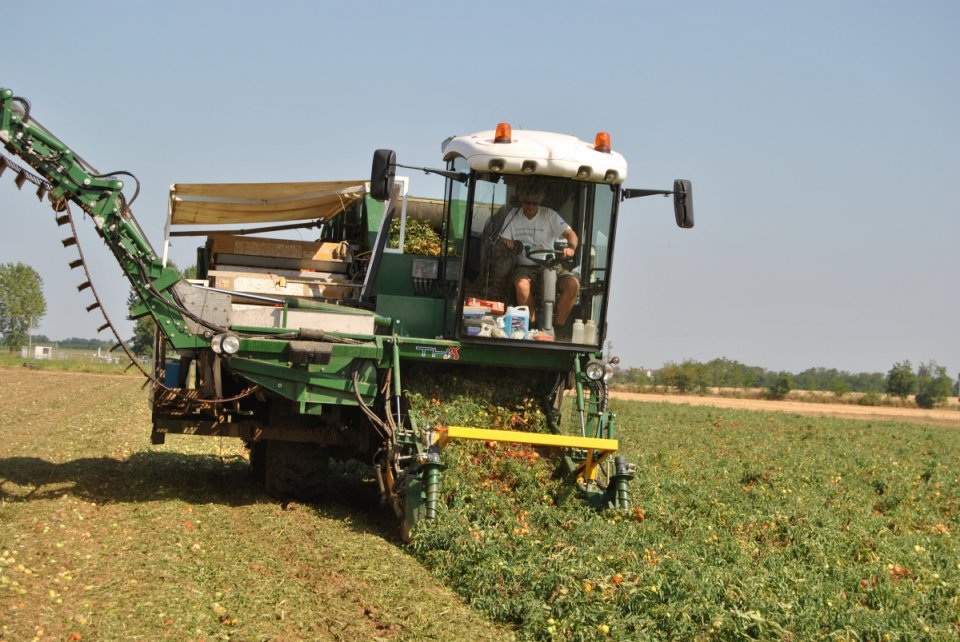
The processed tomato supply chain of northern Italy covers four Regions (Emilia-Romagna, Lombardy, Piedmont, Veneto) and an autonomous Province (Bolzano) and the case study focuses on an area belonging to 37 municipalities of the Provinces of Parma and Piacenza where historical roots and core business are mainly located.
The supply chain is organised in an Inter-branch Organisation recognised by the Region and the European Union. It accounts for 39,000 hectares of tomato plants, comprises 2,000 producers grouped in 15 Producers
Organisations and 24 processing companies operating in 29 plants, processes 3 million tons of tomatoes into concentrate, pulp and paste that represent 50% of the overall Italian processing tomato, 25% of the European production and 6.5% of world production.
Main environmental and social benefits investigated are water quality and supply and healthy functioning soils, whose provision is marketdriven (increasing demand for sustainable food products and for quality,
social and environmental certifications) and characterised by policy support with indirect focus.
34 case studies were planned by the H2020 PEGASUS project in different farming and forest systems and along the supply chain in 10 EU countries, to:
- examine the issues faced in ensuring effective provision of public goods/ecosystem services from farming & forest activities; and
- find solutions to enable the economic social and environmental sustainability of the EU’s farmed & forest areas.
The case study examines how stakeholder interactions, market and environmental pressures, and EU/national
regulations led to an alignment of interests and enabled the introduction of farming methods and technological
innovations to improve the management of water & soil resources.
The provision of environmental and social benefits is indirectly delivered through productive and investment choices of the supply chain actors (producers and processors), which were urged to guarantee production and processing viability by dealing with severe emergencies related to soil and water (mainly nitrate pollution, drought, floods, competition for natural resources) and to gain competitive advantage by meeting new consumers’ demand (certified quality food, environmental-friendly productions).
Faced with the pressing need to tackle the challenges of environmental, economic and social sustainability, the supply chain found a collective response marked by two major turning points: the introduction and widespread application of integrated production in the early ‘90s and of drip irrigation in the early 2000s.
Environmental and social benefits provision is favoured by private initiative and a key role is played by collective action rooted in shared history, mutual trust, common values and goals. However, the supportive role of policies with indirect focus (CMO, RDP, regional funding and services) is also highly relevant.
- The territorial (or supply chain) approach chosen is a key success factor for the sustainability of the initiative as emphasis is not put on crop production alone but on the resilience of the whole supply chain.
- The creation of the Interbranch Organisation bringing together Producers’ Organisations and processing firms helped to overcome the problem of a lack of harmonized requirements for regional Integrated Production and for product traceability.
- The reputation and recognisable quality of the product underpins the relationship with consumers.
- Mutual trust among the parties involved facilitated the formation of collective action to develop strategies jointly to face the threats posed by global competition.
- The adoption of new rules and contractual arrangements between producers and processors, enforced through private schemes, provides some guarantee about market stability, farmers’ income, and on the quality of products from the northern Italian supply chain.
Further improvement in the provision of environmental and social benefits could come from a more widespread adoption of innovative techniques such as conservation agriculture, precision farming and irrigation decision support systems.
Public policies enhanced only indirectly progress and factors enabling awareness and provision of environmental and social beneficial outcomes. Networking, rigorous respect of production protocols, agreed rules of behaviour and widespread use of innovation connected to use of soil and water resulted from economic decisions and governance arrangements of supply chain private actors. The supply chain acts as a point of convergence of all existing policies and financing (sectoral, territorial, environmental, etc.) and managed to drift them to support and implement local economic and environmental strategies over time.
Policies frame a comprehensive local plan for change of the tomato supply chain, but isolated single measures and projects do not necessarily assure robust long-term economic, social and environmental sustainability. In the near future, best practices adopted by the supply chain and changes occurred in local organisational patterns should be taken into deeper consideration and should help to rewrite policy provisions accordingly.
